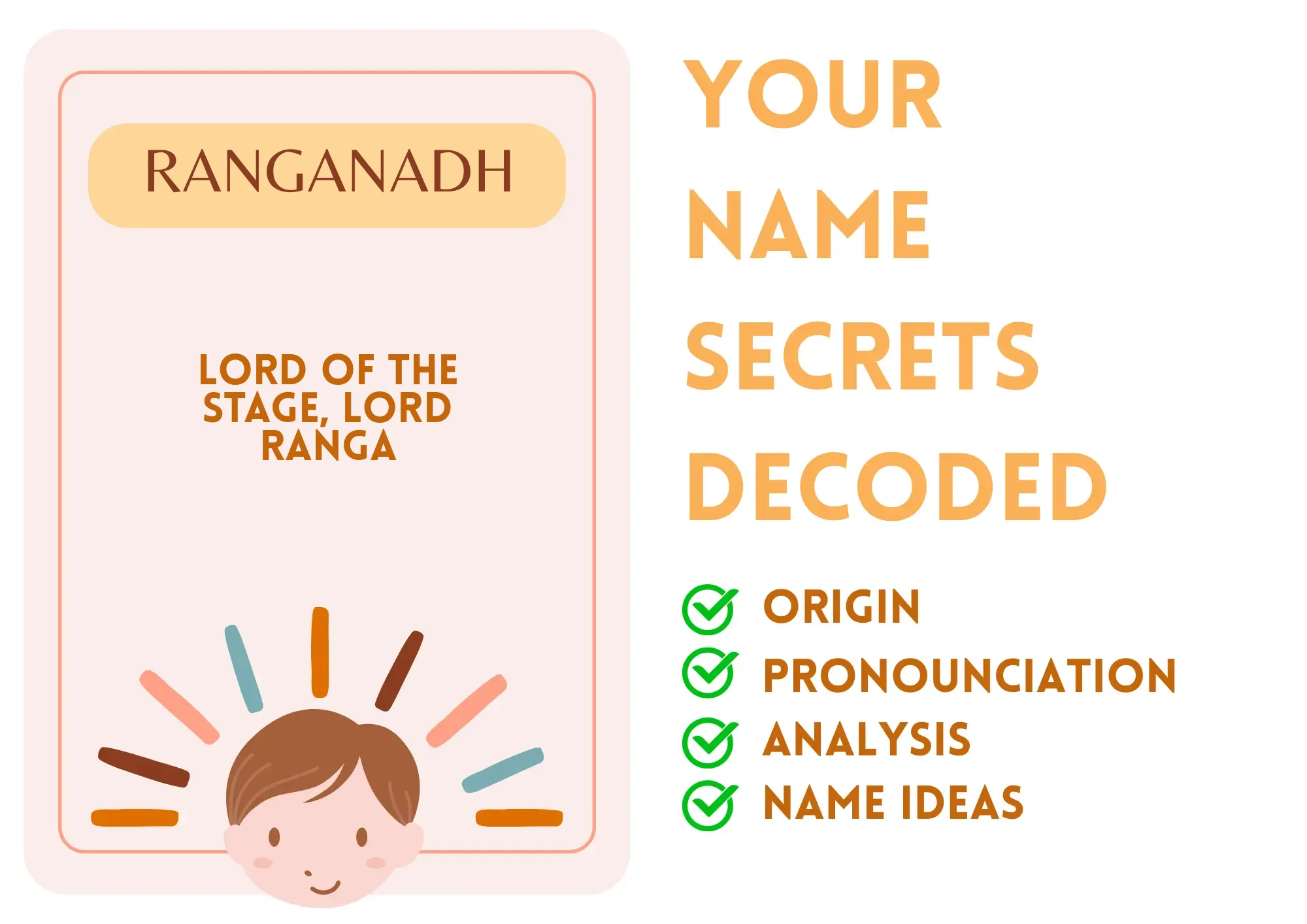
Ranganadh
Ranganadh is a culturally rich name of Sanskrit origin, typically translated as 'Lord of the stage' or 'Lord Ranga,' referring to Lord Vishnu in his avatar of Krishna and associated with theatrical performances. Primarily used within Indian and Hindu cultures, Ranganadh is predominantly a masculine name. The name embodies the significance of art, performance, and divine presence, drawing from the rich traditions of Indian theater and spirituality.
Ranganadh is viewed positively, often evoking feelings of creativity, spirituality, and cultural pride. The name is relatively simple to write and pronounce, with common nicknames like Ranga and Nadh.
Ranganadh holds historical importance within Indian culture, especially in the context of classical dance and drama, where the figure of 'Ranga' symbolizes the divine orchestrator of performances. This name resonates deeply in literature and various forms of art, making it a notable choice for parents.
Basic Information
Gender: Boy
Sounds Like: run-gah-nah-d
Pronunciation Explanation: The name is pronounced with an emphasis on the second syllable 'gah', and each syllable is distinctly articulated.
Summary and Meaning
Meaning: Lord of the stage, Lord Ranga
Origin: The name Ranganadh has Indian origins, primarily rooted in the Hindu culture and Sanskrit language.
Usage: Ranganadh is traditionally a masculine name, strongly associated with male figures in Hindu mythology.
Name Number (Chaldean)
Name Number (Pythagorean)
Name Constellation (Nakshatra)
Name Zodiac Sign (Rashi)
Popularity (Global Rank)
Overall: 95101
Boys: 54235
Most Popular in
Religious and Cultural Significance
Religion: Hindu
Background: In Hindu tradition, Ranganadh is associated with the divine, referring to Lord Vishnu in a celebratory context, particularly within drama and performance.
Cultural Significance: Ranganadh is embraced within Indian arts, symbolizing the connection between spirituality and performance, often chosen for boys born into families involved with theater or dance.
Historical Significance: Ranganadh is significant in classical Indian performing arts, embodying the interplay of spirituality and drama, represented through stories and performances across centuries.
Popular Culture
Literature and Mythology: Ranganadh appears in numerous classical texts and performance scripts, often as a figure representing the divine in the performing arts.
Movies and Television: Characters named Ranganadh or variations appear in Indian films, depicting themes of artistry, devotion, and cultural heritage.
Feelings and Perceptions
Perception: Ranganadh is generally perceived positively, seen as a unique, culturally rich name that carries connotations of artistic expression and spiritual significance.
Positive Feelings: Cultural, artistic, divine, creative, unique.
Negative Feelings: Might be seen as complex or unfamiliar to those outside Indian cultural contexts.
Practical Considerations
Ease of Writing and Calling: The name Ranganadh is moderately easy to write and pronounce, but may present challenges to non-native speakers, consisting of eight letters and four syllables.
Common Typos and Misspellings: Ranganad,Rangnadh,Rangnath,Rangandh
Common Nicknames: Ranga,Nadh,Ranu,Naddy
Ranganadh Popularity
Ranganadh Usage and Popularity By Country
| Country | Rank (Overall) |
|---|---|
| Zambia | 11283 |
| Oman | 12466 |
| India | 20654 |
| United States | 102851 |
| South Africa | 120008 |
Ranganadh Usage and Popularity By City
| City | Rank (Overall) |
|---|---|
| HyderÄbÄd | 5691 |
| Bengaluru | 11584 |
| Visakhapatnam | 3790 |
| Bombay | 25939 |
| Bangalore | 11105 |
| Krishna | 4132 |
| Vijayawada | 1522 |
| Fremont | 3209 |
| Guntur | 4268 |
Compatibility Analysis
Famous Persons Named Ranganadh
No results found for Ranganadh.
Related Names
Similar Sounding Names:
Rangan,Raghav,Ranchor,Ranjith